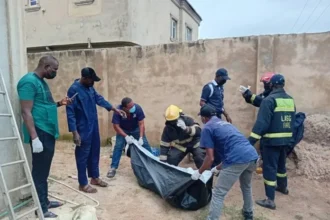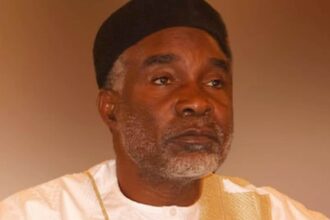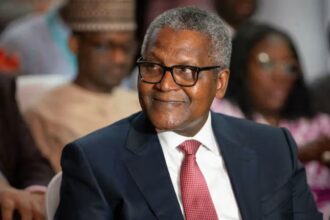...To get all news updates, Join our WhatsApp Group (Click Here)
Also Join our WhatsApp Channel (Click Here)
The United Bank for Africa (UBA) Group recently held its first ever Senior Leadership Forum reflecting the strategic importance and growth potential of its pan-African business. UBA Group Chairman Mr. Tony O. Elumelu convened the Forum to review the impressive growth that the bank’s African network had made over the past 11 years and to provide a platform to reaffirm and embolden its strategic goals.
The Forum brought together 90 participants, including the entire Board of UBA, all Chairmen and all CEOs of UBA subsidiaries across Africa and the United Kingdom. It was timed to coincide with UBA’s Annual General Meeting and Group Board Meeting.
“We are one bank, the United Bank for Africa”, Mr. Elumelu said as he opened the Forum. “Bringing together our senior leadership talent from across the continent and the distinguished leaders who chair our subsidiary businesses is a powerful demonstration of our commitment to forge one bank for Africa.”
“As long-term investors and, may I say, pioneers in pan-African commercial and investment banking, we are deeply committed to the markets in which we operate and to harnessing the potential represented by the wider African economy. Our intention is to be the leader in African financial services, and our recent transactions show this. We see clearly the potential of Africa” said Mr. Elumelu.
UBA subsidiaries operate in 18 African countries and now contribute more than 25 per cent to Group operating revenue. UBA is increasingly recognized as a strong pan-African brand, hailed for democratising banking in its countries of operation whilst participating in landmark financial transactions, including:
· A USD$1.2 billion oil financing agreement with NNPC and Chevron where UBA provided funding for Chevron and NNPC to develop 36 new oil wells that will significantly expand Nigeria’s oil production capacity
· A USD $315 million facility to the Government of Ghana for road projects on the strength of Road Fund levies domiciled with UBA Ghana
· A US$250 million Crude pre-payment facility for Democratic Republic of Congo-based Orion Oil representing the largest reported transaction structured by an African investment bank in 2015 involving fresh capital within the African market.
· A 234 million Euro oil and gas financing deal with Société Africaine de Raffinage (SAR) of Senegal, which underscored its capacity to fund big ticket transactions across Africa
· A USD $180 million to Delta Energy Zambia for the procurement and supply of petroleum products to marketing companies in Zambia
· A USD$90m University of Dakar hostel construction project financed solely by UBA Senegal – African capital, building African infrastructure for African education
“We have done a lot but in many senses we are only beginning to reap the rewards of our network and potential. We are a truly pan-African institution and after this period of consolidation, we know that the continuing expansion of our Africa footprint is a key goal. We must ensure that we have presence in at least 25 countries in the near to medium term, starting from the UMOA and CEMAC zones,” said Mr. Fogan Sossah, Chairman of UBA Senegal during the Forum.
In keeping with the objective of creating an institution worthy of the patronage of clients and the trust of regulators and governments, the three day forum focused on the critical issues and drivers for success across the continent. Seminars were held on Corporate Governance, Corporate Institutionalisation, Board Effectiveness, Compliance, Accountability and more.
Speaking on the breadth and depth of the Forum’s individual sessions, Mrs. Gisele Mudiay, Chairman of UBA Democratic Republic of Congo said: “! Our aspiration for the next five years is to pool knowledge of our individual operating environments and leverage that knowledge to help our customers realize their business goals.”
Noting the difficulties that exist in operating in the diverse economic environments across the African continent, Mr. Ekoto Mukete, Chairman UBA Cameroon said: “While we operate in challenging business environments, we benchmark ourselves against global standards, which means we are able to add real value to our stakeholders. This forum has ensured that we are an army of one, working in each corner of Africa and driving toward one common goal.”
The approval of additional injection of capital into its East African subsidiaries in Uganda, Kenya and Tanzania was communicated at the forum as the group re-affirmed its committment to growth in its countries of operations across the continent.
Commenting on the importance of consolidating pan-African financial expertise and exporting the successful Nigerian model, incoming Group MD/CEO and previous head of UBA Africa, Kennedy Uzoka said: “I have experienced the potential of our pan-African businesses. I know that we can and I commit to ensuring our leadership across Africa. The Senior Leadership Forum reaffirms UBA’s ambition to be the leading pan-African Bank across key indices – brand equity, human capital, customer service and profitability.”
Other items on the agenda at the forum included Know Your Customer (KYC) and Anti-Money Laundering (AML) policies and compliance standards across the Group. The Group Compliance Officer Uche Ike stated that “compliance is non-negotiable. We operate as a global bank, in global centres. We have seen how swiftly internationally and within Africa banks have lost hard earned reputations through laxity in policy compliance and we will not tolerate this in UBA Group“.
The Forum coincided with the 54th Annual General Meeting of UBA(where participants were also able to celebrate the Bank’s strong financial performance) as the week long activities culminated in the dedication of staff at the annual UBA CEO awards ceremony.
UBA reported strong financial results in 2015, in what is largely recognized as a challenging macro environment. Gross earnings were N315bn whilst operating profits stood at almost N70bn. UBA Africa operations currently contribute approximately 25% of these earnings but are expected to grow significantly and over time contribute as much as 50% to overall Group profitability.
You can get every of our news as soon as they drop on WhatsApp ...To get all news updates, Join our WhatsApp Group (Click Here)
Also Join our WhatsApp Channel (Click Here)









